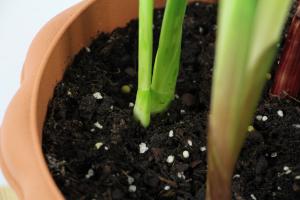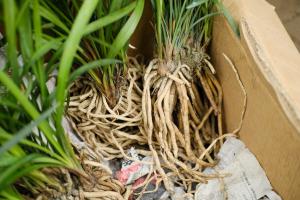How to Transplant an Aloe Plant
Transplanting an aloe plant can be a wonderful way to give it a boost and keep it healthy. Aloe plants can become root-bound if left in the same container for too long, so it鈥檚 important to transplant them every few years. Here鈥檚 how to do it:
Materials Needed
Before you get started, you鈥檒l need to gather a few materials. Here鈥檚 what you鈥檒l need:
A new container that is slightly larger than the current one
Potting soil
Gravel/small rocks
A trowel
Gloves
Step-by-Step Instructions
Follow these simple steps to transplant your aloe plant:
Choose a new container that is about one size larger than the current container. The new container should have drainage holes to prevent the soil from becoming waterlogged.
Add a 1-2 inch layer of gravel or small rocks to the bottom of the new container. This will help with drainage.
Prepare a fresh potting mix by mixing one part sand, one part perlite, and two parts potting soil. Alternatively, you can use a pre-made cactus or succulent potting mix.
Carefully remove the aloe plant from its current container. If the plant is stubborn, you can gently squeeze the sides of the container to loosen it.
Remove any excess soil from the roots by gently shaking them. If there are any dead or rotten roots, trim them off with a sterilized pair of scissors.
Place the aloe plant in the new container and fill in the gaps with the potting mix. Make sure to leave about an inch of space at the top of the container.
Water the newly transplanted aloe plant until the soil is moist but not soggy.
Place the container in a sunny location and wait for the aloe plant to settle in.
Additional Tips
Here are some tips to keep your newly transplanted aloe plant happy and healthy:
Don鈥檛 water the plant too frequently. Allow the soil to dry out completely before watering again.
Aloe plants prefer bright, indirect sunlight. Too much direct sunlight can scorch their leaves.
Fertilize the aloe plant once a month during the growing season with a cactus or succulent fertilizer.
Wear gloves when handling the aloe plant to avoid getting pricked by its spiky leaves.
With these simple steps and tips, you can easily transplant your aloe plant and keep it thriving for years to come.

 how many times do yo...
how many times do yo... how many planted tre...
how many planted tre... how many pine trees ...
how many pine trees ... how many pecan trees...
how many pecan trees... how many plants comp...
how many plants comp... how many plants can ...
how many plants can ... how many plants and ...
how many plants and ... how many pepper plan...
how many pepper plan...




























